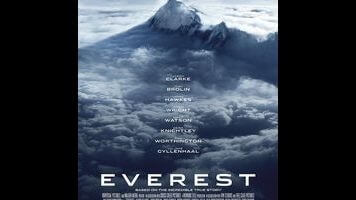For those of us who don’t even like to sit in the nosebleed seats at a theater for fear of toppling into the orchestra pit, Everest is the closest we’re ever going to get to scaling the world’s largest mountain. Part IMAX nature documentary and part Hollywood disaster movie, it does an effective job of conveying what it’s like to climb the mountain, the hours and days spent acclimating on practice hikes, and the punishing physical effects that accompany each subsequent change of altitude. It takes a certain kind of person to want to risk their life—and strain their relationships and drain their savings—just to go through the physical and psychological torment of climbing Mount Everest. And while this movie explains the pain, it doesn’t do as good of a job explaining why it’s worth it. At one point, a journalist played by House Of Cards’ Michael Kelly asks a group of climbers “Why Everest?,” and gets a series of non-answers; if you get it, you get it, apparently. And if you don’t, this thrilling tale of survival might feel more like a death march.
Everest boasts a who’s who of scruffy white-guy actors, including Terminator Genisys’ Jason Clarke as Rob Hall, a friendly, reassuring New Zealander whose company, Adventure Consultants, guides climbers to the top of Everest for $65,000 a pop. From the start of the film—which dramatizes the disastrous May 1996 ascent documented in Jon Krakauer’s book Into Thin Air—emphasis is placed on three team members: Doug (John Hawkes), a struggling mailman on his second attempt; Beck (Josh Brolin), a slow-talking Texan; and Yasuko (Naoko Mori), a Japanese woman who has climbed six of the world’s highest mountains. (Everest will be her seventh.) Under the Reality TV Principle, the amount of humanizing screen time devoted to these characters means that they will either lose (die) or win (emerge as a hero) by the end of the movie. This principle is not inaccurate.
Hall has become somewhat notorious among his more macho counterparts, represented here by hippie daredevil Scott Fischer (Jake Gyllenhaal) and gruff Russian Anatoli Boukreev (Ingvar Sigurðsson). The other guides feel that Rob is cheapening the Everest experience by shepherding weak climbers who otherwise wouldn’t be able to make it to the peak. But after some persuasion from Rob, Scott and Anatoli agree to cooperate, and the two teams make their final ascent on May 10, 1996. That ascent begins with triumph, in an emotional scene where the climbers plant their flags on the famous peak. But then disaster strikes—and oh, how does it strike, and strike, and strike again—in the form of a freak snowstorm that strands several climbers atop the mountain. The blowing snow and cold-weather gear make who’s facing which mortal danger obscure at points, a problem director Baltasar Kormákur cleverly solves in the form of camp “Mom” Helen (Emily Watson), whose radio conversations help viewers follow who’s where and in what state. At first, with the fates of the different climbers unsure, Everest is unbearably tense. But as the true consequences of the disaster become clear, that tension dissolves into pummeling sadness amid tearful goodbyes and frozen corpses.
The best argument in favor of what otherwise would be a pointlessly cruel loss of human life are the sweeping, heart-stoppingly beautiful mountain vistas. (See this one in IMAX if you can.) Beginning with a helicopter shot of tiny hikers crossing a flimsy rope bridge over a huge canyon, Everest boasts a handful of spectacular shots that show how small the climbers really are, usually by panning from a team of struggling hikers to the vast, craggy expanses beneath them. But those shots are relatively scarce, and one of the most effective uses of IMAX comes early in the film, where Beck nearly falls into a terrifyingly deep ice chasm while trying to cross it on a wobbly ladder. So while the mountain is referred to as a character in its own right—“The mountain makes its own weather,” Rob says at one point—its towering physical presence is ultimately overshadowed by the human drama. Maybe if we experienced less of the climbers’ suffering and more of the mountain’s majesty, their sacrifices would be easier to understand.









































